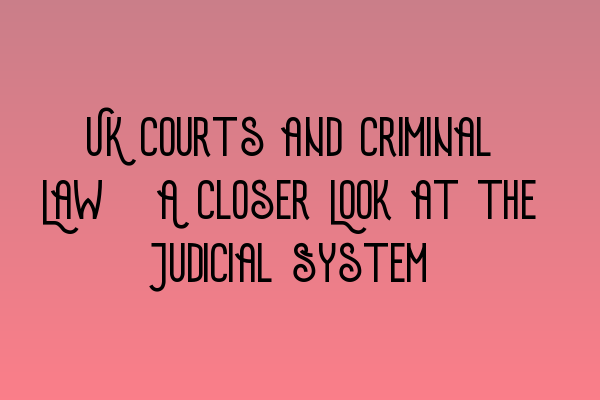UK Courts and Criminal Law: A Closer Look at the Judicial System
Welcome to SQE Criminal Law & Practice Law UK! In this blog post, we will be taking a deep dive into the UK courts and criminal law system, providing you with a comprehensive understanding of how the judicial system works in criminal cases.
The UK Courts System
The UK courts system is made up of several layers, each with its own role and responsibilities. At the lowest level are the Magistrates’ Courts, which handle the majority of criminal cases. These courts deal with less serious offenses and serve as the entry point for most criminal proceedings. If a case is more complex or serious, it may be transferred to the Crown Court, where more significant trials take place.
For those interested in pursuing a career in criminal law, it is essential to understand the hierarchy of the UK courts system and how cases progress through the various levels. The SQE 1 Practice Exam Questions can be a helpful resource in familiarizing yourself with the different court levels and their functions.
The Criminal Law Process
When a crime is committed, the police investigate the incident and gather evidence. If they believe they have enough evidence to proceed, they will submit a file to the Crown Prosecution Service (CPS), who will review the case and determine whether to proceed with criminal charges.
Once criminal charges are filed, the case will be brought before a Magistrates’ Court for an initial hearing. This is where the defendant will be informed of the charges against them and given the opportunity to enter a plea.
If the defendant pleads guilty, the case may proceed to sentencing, where the court will determine an appropriate punishment. However, if the defendant pleads not guilty, the case will be transferred to the Crown Court for a trial. The SQE 2 Preparation Courses can equip aspiring criminal law professionals with the knowledge and skills needed to navigate the complexities of criminal trials.
The Role of Judges and Juries
In the UK judicial system, judges play a crucial role in overseeing trials and ensuring that they are conducted fairly and impartially. They are responsible for making legal rulings, guiding the jury, and sentencing the convicted individuals.
On the other hand, juries are made up of members of the public who are randomly selected to serve in criminal trials. Their role is to listen to the evidence presented in court and determine whether the defendant is guilty or not guilty based on the facts and the law. Understanding the dynamics of judges and juries is vital for anyone pursuing a career in criminal law, and the SQE 1 Practice Mocks FLK1 FLK2 can provide valuable practice scenarios to enhance your understanding of courtroom proceedings.
Keeping Up with SRA SQE Exam Dates
If you are preparing for the SRA SQE exams, it is essential to stay updated with the latest exam dates. The SRA SQE Exam Dates article provides comprehensive information on the upcoming exam schedules, enabling you to plan your preparation effectively and ensure you are fully prepared.
Thank you for taking the time to learn more about the UK courts and criminal law system. We hope this article has provided you with valuable insights into how the judicial system operates in criminal cases. If you have any further questions or if you’re interested in enrolling in our SQE 1 Preparation Courses, please feel free to get in touch with SQE Criminal Law & Practice Law UK.
